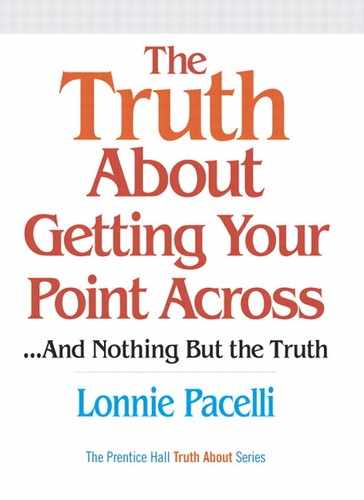Truth 48
Keep Stressful Meetings from Spontaneously Combusting
It was late afternoon on a sunny spring day. I was cleaning up a few last items before heading out for the day. Just then, an acquaintance I had met only a week earlier (I'll call him "Phil") knocked on my door, said hello, came into my office, closed the door, and sat down. I was a bit surprised, because I had planned on just saying hello and then hightailing it out of my office. For the next hour and a half, Phil poured out his heart about his job, his marriage, and his financial situation. He shifted between sadness, fear, and anger throughout our discussion. It was obvious that he was experiencing some major problems. I was caught flat-footed because I wasn't prepared to have such an intimate conversation, let alone with someone I had just met. I was also getting very impatient with Phil because he had interrupted my plans. Rather than trying to reschedule the discussion, I blurted out that I needed to go and left him with the clear impression that I was perturbed with him. I walked out of my office and headed to my car, leaving Phil still upset in the building.
I wasn't prepared to have such an intimate conversation, let alone with someone I had just met.
During my drive home, I reflected on my conversation with Phil and felt more and more horrible with each mile. How could I have been so insensitive? Phil was definitely hurting, and rather than try to reschedule some time with him, I cut him off because he interrupted my time. I blew it big time.
It happens. A discussion with someone gets tense, stressful, or upsetting. I've been in a number of discussions in my career where anger or tears were involved. Sometimes I've been able to handle it well and stay calm, empathetic, and supportive of the other person. Then there are times like my encounter with Phil. My own stress fueled the negative energy in the meeting and, rather than helping the discussion, I contributed to its destruction.
Do your part to keep discussions positive and constructive when the stress level goes up by doing the following:
- Don't say "Calm down." Saying this to someone who is already upset or stressed can make matters worse, since the person may view this as a personal attack. You want to calm the person down, but you need to use calm, empathetic statements such as "I can understand how that upset you." This shows that you acknowledge his frustration and empathize with the situation. You may or may not agree with his view; that's OK. Focus on calming him down through your voice and actions versus a command.
- Take a break. If the stress level starts getting high, consider taking a quick break to let the other person collect his or her thoughts and to keep your stress level down. Politely excuse yourself, and confirm you'll be back. Leave the room for a few minutes and grab a soda. Come back using a calm and quiet tone, and refocus the conversation to the issue at hand.
- Keep your emotions in check. One of you being stressed or upset is bad enough; both of you getting that way is sure to make things worse. Work hard to keep your emotions in check, and take some deep breaths along the way to keep yourself calm. If you feel yourself getting too stressed or upset, and you can't bring yourself down while in the discussion, take a break to collect yourself, and let the other person do the same.
My stress fueled the negative energy in the meeting, and I contributed to its destruction.
- Reschedule your meeting. If you're out of time or you can't reach some constructive end with the other person, reschedule your meeting to another time when you'll be able to dedicate more time and things will have calmed down. The next meeting will most likely start more constructively and will be focused and less stressful.
- Take a few minutes before your next meeting. If your own stress level was elevated during the meeting, give yourself a few minutes to calm down and relax before starting another meeting. Your next meeting attendees don't deserve to experience any of your wrath because your last meeting stressed you out. Take a quick walk and take a few "cleansing breaths" (if you've gone through Lamaze childbirth classes, you know what I mean) before the next meeting. Your meeting attendees will thank you for it.
Stressful and upsetting discussions are tough. When you find yourself in one of these discussions, use calm tones, be empathetic, and consider taking a break if you see yourself losing control. Also, remember not to take your last meeting's stress into your next meeting. A domino effect of stressful meetings will just make your day tougher and keep you from getting your point across.
